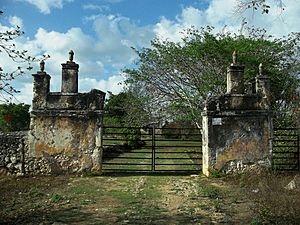Hacienda Kankabchén (Tixkokob) facts for kids
Quick facts for kids
Hacienda Kankabchén
|
|
|---|---|
|
Private residence
|
|

Entrance to Hacienda Kankabchén, Tixkokob, Yucatán
|
|
| Country | Mexico |
| Mexican States | Yucatán |
| Municipalities | Tixkokob |
| Time zone | UTC−6 (CST) |
| • Summer (DST) | UTC−5 (CDT) |
| Postal code |
97473
|
| Area code | 991 |
Hacienda Kankabchén is an old estate located in the Tixkokob Municipality in Yucatán, a state in southeastern Mexico. It was one of many large farms that became important during the 1800s. This was due to the henequen boom, when a plant called henequen was grown for its strong fibers. These fibers were used to make ropes and other products. There are several other places in Yucatán with a similar name, like Hacienda Kancabchén in Baca.
Contents
What's in a Name?
The name "Kankabchén" comes from the ancient Mayan language. It means "the well of the red ground." This name likely describes the type of soil and the water source found at the hacienda.
Finding Hacienda Kankabchén
If you were to visit Hacienda Kankabchén from the city of Mérida, you would drive east. From the main ring road (Periférico), you would take Calle 65 for about 19 kilometers until you reach Tixkokob. Then, you would travel 5 kilometers north on Calle 18 to find the Hacienda Kankabchén.
A Look Back: The History of Haciendas
Haciendas were large estates or plantations, especially common in Mexico. Many of these, including Hacienda Kankabchén, became very important during the 19th century. This was when the demand for henequen fiber grew, making these haciendas wealthy.
However, things changed significantly in 1937. The Mexican government, led by President Lazaro Cardenas, made big changes to land ownership. This was called the agrarian land reform. It meant that many haciendas were turned into collective farms called ejidos. This left only a small part of the land (about 150 hectares) for the original owners to use as private property.
What Remains of the Buildings?
Looking at photographs of Hacienda Kankabchén, it's clear that the buildings have fallen apart over time. There are no buildings left that people can live in today.
Who Lived Here? Population Changes
Before 1937, many people lived and worked on the henequen plantations. The numbers in the table below show how many people lived on the farm itself. After the land reform in 1937, the haciendas were no longer independent communities. The numbers after that year show people living in the surrounding community. The remaining Hacienda Kankabchén only housed the owner's family.
According to a census taken in 2005 by the INEGI, no one lives permanently in the Hacienda Kankabchén area anymore.
| Year | 1900 | 1910 | 1921 | 1930 | 1940 | 1950 | 1960 | 1970 | 1980 | 1990 | 1995 | 2000 | 2005 |
|---|---|---|---|---|---|---|---|---|---|---|---|---|---|
| Population | 217 | 268 | 119 | 121 | 82 | 86 | 73 | 93 | 8 | ? | ? | 0 | 0 |
Photo Gallery
See also
 In Spanish: Kankabchén (Tixkokob) para niños
In Spanish: Kankabchén (Tixkokob) para niños



















